Published Dec 9, 2022
Star Trek Directors' School: Michael Dorn
The prolific Star Trek actor details his Hollywood journey from acting to directing.
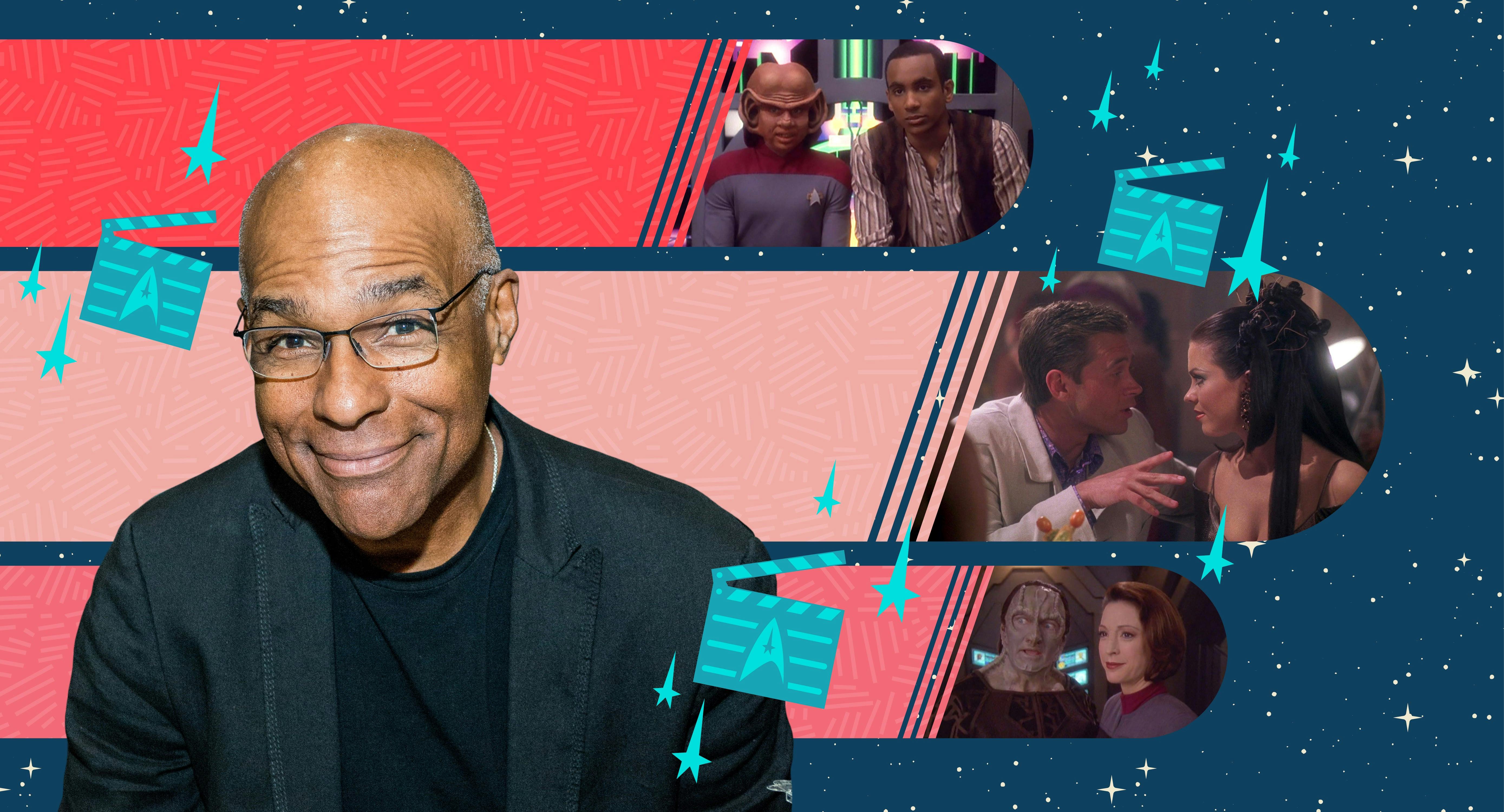
Getty Images / StarTrek.com - Rob DeHart
Welcome to Star Trek's Director School, StarTrek.com's interview series with series' main, recurring, and guest stars who parlayed their experience with the Delta Quadrant and beyond into directing for the franchise.
Michael Dorn spent countless hours in a makeup chair in order to play our favorite Klingon Worf on Star Trek: The Next Generation and on Star Trek: Deep Space Nine. But he also spent quite a bit of time directing Star Trek episodes.
He called the shots on DS9's “In the Cards,” “Inquisition” and “When It Rains...,” as well as the Star Trek: Enterprise installment, “Two Days and Two Nights.” Dorn, like a number of his fellow actors turned directors, prepped for his helming stints by going through Star Trek’s unofficial directors’ school.
StarTrek.com recently chatted with him about his initial interest in directing, experiencing the directors’ school, bringing his four episodes to the screen and his hope of directing again soon. Here’s what he had to say:
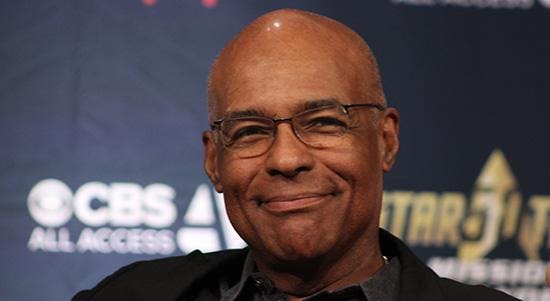
StarTrek.com: At what point did you realize you wanted to direct? Was it while you were still on The Next Generation?
Michael Dorn: Actually, that's a very good question and there's a very long-winded story about it. When I got in the business, which was when I moved back from San Francisco – had to be 1976 or so – that's what I wanted to do — direct. I was trying to get in the business, and a good friend of mine from high school, his dad was assistant director on The Mary Tyler Moore Show. His dad asked, "Hey Michael, there's a little position opening. Would you like to come and work on the show?" I said, "Yeah, but I really want to direct." He said, "Well do this and then you can see what the business is like. You can get behind-the-scenes and shadow and do all that stuff." I said, "Great." I had no intention of acting.
In the middle of working on the show, they wanted me to stand in for a guest actor who had to go to the hospital. I did it. We did a run-through, and since I’d worked with the people for a year, I was comfortable. It wasn't a big deal. I did the lines and did the action. For two weeks after that, everybody was saying, "Michael, you've got to forget about directing, you’ve got to act. You really are good." What made me change my mind [was when] they said, "Look, it's going to take you a long time to direct. It’s just the way it is. In the meantime, you could act and make some money." Being a middle-class kid from Pasadena, I said, "OK, that sounds logical.”
StarTrek.com: You assumed you’d act for a couple of years, make some money, and then devote yourself to directing, but the acting never went away, right?
Michael Dorn: Right. I was very fortunate because I always got great jobs, so I never had that moment where I went, “OK, now's the time to direct.” What happened next was, after my first year on Next Generation, the show was definitely going to go on and they were fairly happy with everybody. One of the producers says, "Oh, well, Michael, I guess you'll be wanting more money now.” He was just joking, but I said, "Well, actually, I want to direct."
It just didn’t work out that way because, in order to direct Next Generation, you had to go to the directing school we had where, when you're not working, you spend time with the directors and editors, and all that. But I was in makeup the whole time, five days a week, 15 hours a day. I just didn't have any time.
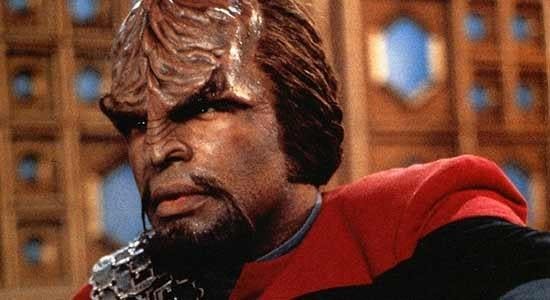
StarTrek.com: Can we assume, though, that when you moved over to Deep Space Nine, you made it part of your contract that you’d get to direct?
Michael Dorn: I had one a year, [was] what they said. And they worked it out logistically; on DS9, we didn’t have the Bridge like we did on Next Generation, where most of the action took place. I didn’t need to be in every scene of DS9; that gave me the time to do the directing school.
StarTrek.com: What do you remember of the process? Who were the directors you shadowed? What caught your eye as you observed them at work?
Michael Dorn: They all were really, really good. James Conway was one I shadowed. Gabrielle Beaumont, I shadowed her for a while. And most everybody else. Gabrielle Beaumont was really good; she was very calm and knew her stuff. I really liked Rick Kolbe a lot. I took a directing class in college, actually, so I always felt I had an eye for it. My professors were like, "Wow, Michael, you're good at this. You're really good at this. This is something you can do.”
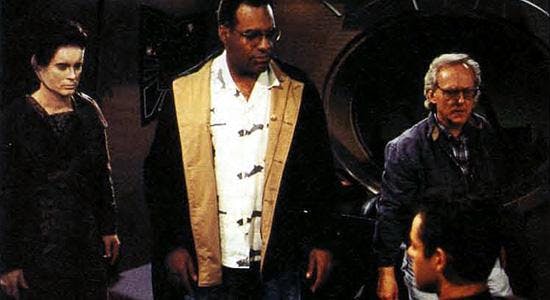
StarTrek.com: What was toughest aspect, in terms of Star Trek, to grasp?
Michael Dorn: The thing that I found most challenging is the politics of the business, the politics of each show. The directing part is easy for me and I can do it. The funny thing is that I learned that the first episode on Deep Space Nine. And then when I did Enterprise, same thing. Even though these were people I've known for 20 years, it's a lot of politics, and you just have to navigate it.
StarTrek.com: You ultimately directed four episodes of Star Trek — “In the Cards,” “Inquisition,” and “When It Rains” for DS9, and “Two Days and Two Nights” for Enterprise. We’re not going to ask you to go into detail on all of them, so let’s focus on your first one, "In the Cards." How helpful was it to you that it was a pretty cool script that flipped the A and B stories, and that it was a two-hander between Jake and Nog?
Michael Dorn: I've got to say I had a lot of good ideas, but a lot of times, your good ideas are not what they're looking for. Television is a producer's medium. But, I liked it. I thought it was a good story; a different episode than what they were doing. We’d been in the middle of getting our asses kicked around the galaxy, and here you have this lighthearted story about a Willie Mays baseball card. It was a very interesting dichotomy, and I like doing that stuff.
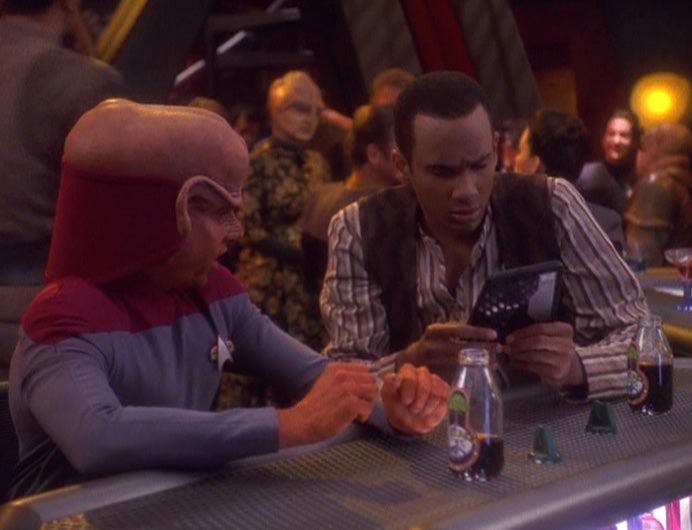
StarTrek.com
The second one I did [“Inquisition”]; I liked that better than the first, and the other two were interesting. But that first one, everyone was very helpful and very supportive. One thing I did learn from watching the other directors we had was that you can’t come in thinking you're going to order people around. That doesn't work well, especially with crews that’ve been together a long time. You basically come in and say, "OK, guys, let's jump into this thing." You allow people to do their job. I said, “Everybody is equal. Everybody has a say. If you have a concern, come to me. Let's get it done.” I think that helped. Plus, a big thing for me is I love problem-solving. Whenever someone said, "Oh, Michael, look…,” I’d say, "OK. Let's go through it. What can we do? Let’s talk it through."
StarTrek.com: You directed Louise Fletcher in that first episode. What was it like to give notes to an Oscar winner your first time out?
Michael Dorn: It was fairly daunting. Come on, I saw Cuckoo's Nest and was blown away by it. And here I am going, "Now, Ms. Fletcher..." It was pretty wild.
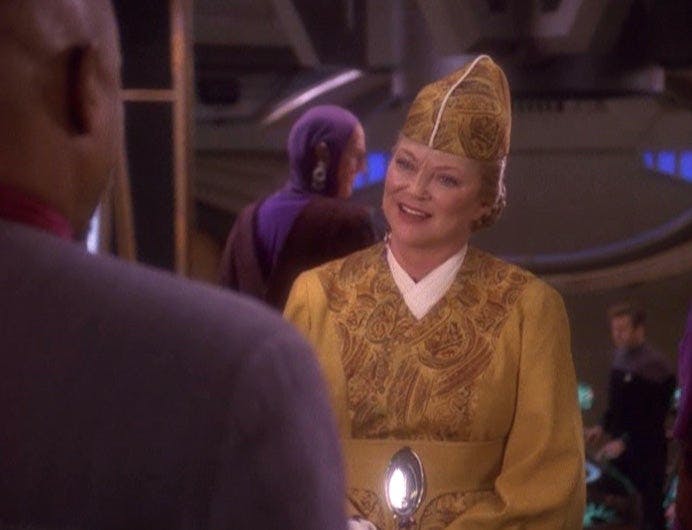
StarTrek.com
StarTrek.com: You went on to direct other Star Trek episodes, a pilot you also acted in, and more. How pleased were you that you got your opportunity to start as a director on Star Trek? And do you still want to direct more?
Michael Dorn: I'm appreciative of getting to direct on Star Trek. And, yes, I want to direct more. I love sitcoms because it’s like doing a little play every week; it’s live and there’s an audience. I think I have a real good talent for comedy, and people seem to think so, too. But, especially outside of Star Trek, I’d do an episode and they go, "Wow, Michael, that was wonderful. We gave you a really difficult episode and you did a great job. You're going to be working with us." And the show would get canceled. Or something wouldn't work out. That happened on VIP with Pamela Anderson; the show ended. Then, I go to According to Jim, and the producer said, "Michael, you've got to come and shadow. You could do this show." He knew my comedic stuff. I did the shadowing. ABC was into diversity. And something happened; I don't know what it was. They wouldn't hire me for the show.
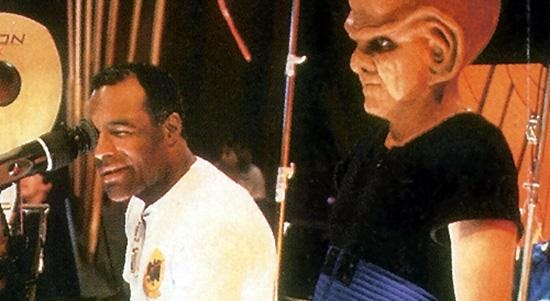
A few of the producers from that show, they go [on to] do Hope & Faith. I go there, I shadow, and I direct an episode. It's a show with montages and stunts and people getting sprayed with water. I do it — it's funny, on time, no overtime. They said, "Michael, plan on spending six months in New York because you're going to do it." Great. The show gets canceled. But, yes, I still totally want to direct, and especially now because a lot of the networks have an edict about diversity. When I was directing, they did not have that edict. Now, they do, and I have experience directing. So, hopefully I will get back into it soon.
My First Contact with Michael Dorn
This article was originally published on July 23, 2018.
Stay tuned to StarTrek.com for more details! And be sure to follow @StarTrek on Facebook, Twitter, and Instagram.

